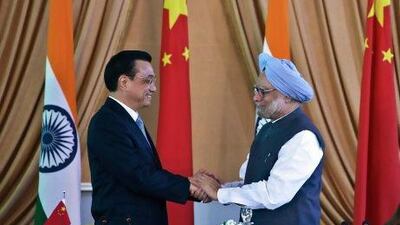NEW DELHI // India and China agreed yesterday to make a fresh push to resolve a long-running border dispute in a remote Himalayan region, on the second day of Chinese premier Li Keqiang's visit to New Delhi.
Mr Li, making his first foreign trip since taking office, said Beijing was determined to build up trust with New Delhi as he and a team of ministers signed a series of agreements with India.
His host, Indian prime minister Manmohan Singh, also stressed he regarded a good bilateral relationship as crucial to the wider region's development.
In a statement following talks yesterday, Mr Li said: "Since we're friends, we can speak candidly . . . We won't deny there are problems between the two sides."
But "both sides believe, with regard to the boundary question, that the sides have developed principles to settling the question", Mr Li said.
The talks follow a border confrontation last month when New Delhi accused a Chinese army platoon of entering and setting up camp nearly 20 kilometres into Indian-claimed territory.
The stand-off lasted three weeks before diplomatic efforts led to the Chinese troops pulling back over the Line of Actual Control, which demarcates the border between India-administered Kashmir and China's Xinjiang province.
The Line of Actual Control has never been formally demarcated, although the two countries have signed accords to maintain peace since the border region saw a brief Indo-Chinese war in 1962.
Mr Singh said officials from both countries would meet soon to devise the framework for an agreement to end the border dispute.
"We agreed that our special representatives will meet soon to continue discussions seeking an early agreement on a framework for a fair, reasonable and mutually acceptable boundary settlement," Mr Singh said.
Srinath Raghavan, a New Delhi-based historian and defence analyst who is a senior fellow at the Centre for Policy Research think tank, told The National that the two countries were working on a second phase in border talks.
"We've passed the first phase, which is basically setting down the political parameters," Mr Raghavan said.
"The second phase would be what they call a framework agreement. Broadly speaking, it involves asking: 'What are you willing to give up? What are we willing to give up?'
"We're moving slowly towards the second phase now. There's an opening in negotiations now that is worth exploring."
No further details on the bilateral working group's agenda was released to the media.
The two governments signed eight agreements on Mr Li's first full day in India.
The agreements included setting up three trade working groups to streamline bilateral trade, as well as a pact by which China will share hydrological information on its section of the Brahmaputra river, which crosses the border into India.
India's ministry of water resources also signed a memorandum of understanding with China's national development and reform commission to cooperate in water-efficient irrigation technology.
In a joint news conference, Mr Li stressed the importance of achieving a "dynamic balance" in bilateral trade. The two countries notched up a trade volume of US$66 billion (Dh242bn) last year, but the deficit - in favour of China - was $29 billion.
India has been pressing to step up its exports to China.
As the two leaders met, Tibetan student activists held protests outside the Chinese premier's hotel and elsewhere in central Delhi.
One activist climbed the wall of a petrol station near the hotel and tossed a "Free Tibet" banner into its compound.
Police enforced strict traffic controls in the area and shut down a Metro station to prevent protesters from arriving in large numbers, resulting in gridlock for much of the afternoon. Three Tibetan activists were arrested.
Mr Li, who arrived in New Delhi on Sunday, leaves today for Mumbai, where he will address a business conference, before travelling on to Pakistan, Switzerland and Germany.
* With Agence-France Presse
twitter: For breaking news from the Gulf, the Middle East and around the globe follow The National World. Follow us

